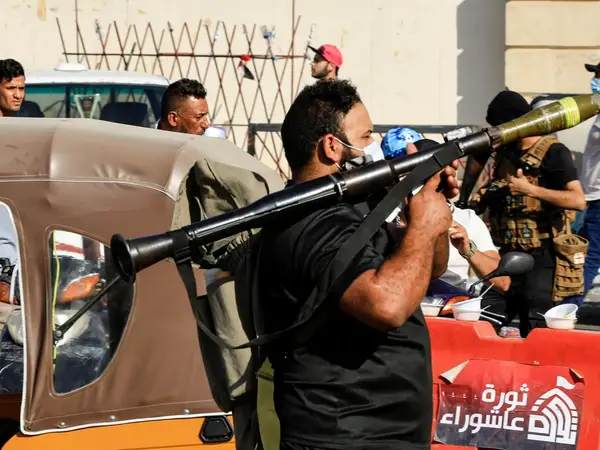Nearly 20 people were killed in Iraq on Monday as opposition cleric Moqtada al-Sadr’s supporters clashed with Iran/backed militia groups in major cities.
Clashes continued Tuesday, as Iraqi militias fired several rockets at Baghdad’s fortified Green Zone for a second day as hostilities intensified between rival Shi’ite Muslim groups, the military said.
Iran International’s correspondent in Iraq reported Tuesday that Sadr’s armed supporters have occupied all bridges on the Tigris River in Baghdad, except one crossing that kinks to the venue of a gathering by their opponents.
Just before noon local time, our correspondent also reported that pro-Iran politician and former prime minister Nouri al-Maliki's residence in Baghdad was surrounded by Sadrist crowds but pro-Iranian militia were using heavy weapons to defend it. Allegedly dozens of Sadr's supporters were wounded by gunfire.
She also reported that many websites affiliated with political groups, including some belonging to the government, were unavailable on Tuesday.
Streets were mostly empty of ordinary people as gunmen cruised in pickup trucks carrying machine guns and brandishing grenade launchers. Overnight, sustained gun and rocket fire rang out across the Iraqi capital.
Clashes on Monday, which killed nearly 20 people, jolted Iraq into new violence as supporters of al-Sadr, a former anti-US insurgent leader, faced off with Shi’ite armed groups mostly loyal to Iran.
There were reports Monday night that pro-Iran militia fired at Sadrists in Baghdad’s Green Zone, but it is not clear if how many people were killed. In turn, Sadrists said they were targeting offices and bases of pro-Iranian armed groups.
Many foreign governments have urged citizens to leave Iraq. Iranian media reported that all air and land borders with Iraq are closed, as the Iranian embassy in Baghdad and other missions face attacks by Sadrists.
A prolonged political deadlock after an October election, during which the two camps have competed for power, has given the country its longest run without a government and led to new unrest as Iraq struggles to recover from decades of conflict.
This time, the fighting is among the Shi’ite majority that has ruled Iraq since the 2003 US invasion which toppled Sunni dictator Saddam Hussein.
Sadr has positioned himself as a nationalist who opposes all foreign interference, whether from the United States and the West or from Iran. He commands a thousands-strong militia and has millions of loyal supporters across the country. His opponents, longtime allies of Tehran, control dozens of paramilitary groups heavily armed and trained by Iranian forces.
Sadr and his opponents have long dominated state institutions and run large parts of the Iraqi state.
Part of Sadr’s support comes from disgruntled Iraqis who launched anti-government protests in 2019, lasting for months and met opposition from Iran-linked groups. These Iraqis were demanding efficient governance and blamed Iran for interfering in Iraq politics and contributing to corruption and lack of services.
Iraq is one of the world’s largest oil exporters but nearly two decades after Saddam was toppled, still suffers from lack of some basic services such as reliable electricity for people.
With reporting by Reuters
